- Home
- Amin Maalouf
Samarkand Page 2
Samarkand Read online
Page 2
Having dismissed this group, Abu Taher signalled to his militiamen to approach. They reeled off their report and replied to questions, having to explain how they had allowed such a crowd to gather in the streets. Then it was the turn of Scar-Face to give his explanation. He leant toward the qadi who seemed to have known him a long time, and started off on an animated monologue. Abu Taher listened closely without revealing his own feelings. Then, having taken a few moments to think it over, he gave an order, ‘Tell the crowd to disperse. Let every man go home by the shortest route and,’ addressing the attackers, ‘you all go home too. Nothing will be decided before tomorrow. The defendant will stay here overnight and he will be guarded by my men, and none other.’
Surprised by being asked so speedily to disappear, Scar-Face made a feeble protest but then thought the better of it. He wisely picked up the tail of his robe and retreated with a bow.
When he was alone with Omar, the only witnesses being his own confidants, Abu Taher pronounced a mysterious phrase of welcome, ‘It is an honour to receive the famous Omar Khayyam of Nishapur.’
He revealed not the slightest hint of emotion. He was neither sarcastic nor warm. His tone was neutral, his voice flat. He was wearing a tulip-shaped turban, had bushy eyebrows and a grey beard without moustache, and was giving Khayyam a long piercing gaze.
The welcome was the more puzzling since for an hour Omar had been standing there in tatters, for all to see and laugh at.
After several skilfully calculated moments of silence, Abu Taher added, ‘Omar, you are not unknown in Samarkand. In spite of your tender years, your knowledge has already become legendary, and your talents are talked about in the schools. Is it not true that in Isfahan you read seven times a weighty work by Ibn Sina, and that upon your return to Nishapur you reproduced it verbatim from memory?’
Khayyam was flattered that this authentic exploit was known in Transoxania, but his worries had not yet been quelled. The reference to Avicenna from the mouth of a qadi of the Shafi rite was not reassuring, and besides, he had not yet been invited to sit down. Abu Taher continued, ‘It is not just your exploits which are passed from mouth to mouth, but some very curious quatrains have been attributed to you.’
The sentence was dispassionate. He was not accusing but he was hardly acquitting him – rather he was only questioning him indirectly. Omar ventured to break the silence. ‘The rubai which Scar-Face quoted was not one of mine.’
The qadi dismissed the protest with a gesture of impatience, and for the first time his voice took on a severe tone. ‘It matters little whether you have written this or that verse. I have had reports of verses of such profanity that I would feel as guilty quoting them as the man who spread them about. I am not trying inflict any punishment upon you. These accusations of alchemy cannot just go in one ear and out of the other. We are alone. We are two men of erudition and I simply wish to know the truth.’
Omar was not at all reassured. He sensed a trap and hesitated to reply. He could see himself being handed over to the executioner for maiming, emasculation or crucifixion. Abu Taher raised his voice and almost shouted, ‘Omar, son of Ibrahim, tent-maker from Nishapur, can you not recognize a friend?’
The tone of sincerity in this phrase stunned Khayyam. ‘Recognize a friend?’ He gave serious thought to the subject, contemplated the qadi’s face, noted the way he was grinning and how his beard quivered. Slowly he let himself be won over. His features loosened and relaxed. He disengaged himself from his guards who, upon a sign from the qadi, stopped restraining him. Then he sat down without having been invited. The qadi smiled in a friendly manner but took up his questioning without respite. ‘Are you the infidel some people claim you to be?’
It was more than a question. It was a cry of distress that Omar did not overlook. ‘I despise the zeal of the devout, but I have never said that the One was two.’
‘Have you ever thought so?’
‘Never, as God is my witness.’
‘As far as I am concerned that suffices, and I believe it will for the Creator also. But not for the masses. They watch your words, your smallest gestures – mine too, as well as those of princes. You have been heard to say, “I sometimes go to mosques where the shade is good for a snooze.”’
‘Only a man at peace with his Creator could find sleep in a place of worship.’
In spite of the qadi’s doubting scowl, Omar became impassioned and continued, ‘I am not one of those for whom faith is simply fear of judgement. How do I pray? I study a rose, I count the stars, I marvel at the beauty of creation and how perfectly ordered it is, at man, the most beautiful work of the Creator, his brain thirsting for knowledge, his heart for love, and his senses, all his senses alert or gratified.’
The qadi stood up with a thoughtful look in his eyes and went over to sit next to Khayyam, placing a paternal hand on his shoulder. The guards exchanged dumbfounded glances.
‘Listen, my young friend. The Almighty has granted you the most valuable things that a son of Adam can have – intelligence, eloquence, health, beauty, the desire for knowledge and a lust for life, the admiration of men and, I suspect, the sighs of women. I hope that He has not deprived you of the wisdom of silence, without which all of the foregoing can neither be appreciated nor preserved.’
‘Do, I have to wait until I am an old man in order to express what I think?’
‘Before you can express everything you think, your children’s grandchildren will be old. We live in the age of the secret and of fear. You must have two faces. Show one to the crowd, and keep the other for yourself and your Creator. If you want to keep your eyes, your ears and your tongue, forget that you have them.’
The qadi suddenly fell silent, but not to let Omar speak, rather to give greater effect to his admonition. Omar kept his gaze down and waited for the qadi to pluck more thoughts from his head.
Abu Taher, however, took a deep breath and gave a crisp order to his men to leave. As soon as they had shut the door behind them, he made his way towards a corner of the diwan, lifted up a piece of tapestry, and opened a damask box. He took out a book which he offered to Omar with a formality softened by a paternal smile.
Now that book was the very one which I, Benjamin O. Lesage, would one day hold in my own hands. I suppose it felt just the same with its rough, thick leather with markings which looked like a peacock-tail and the edges of its pages irregular and frayed. When Khayyam opened it on that unforgettable summer night, he could see only two hundred and fifty-six blank pages which were not yet covered with poems, pictures, margin commentaries or illuminations.
To disguise his emotions, Abu Taher spoke with the tones of a salesman.
‘It’s made of Chinese kaghez, the best paper ever produced by the workshops of Samarkand. A Jew from the Maturid district made it to order according to an ancient recipe. It is made entirely from mulberry. Feel it. It has the same qualities as silk.’
He cleared his throat before going on.
‘I had a brother, ten years older than I. He died when he was as old as you. He had been banished to Balkh for having written a poem which displeased the ruler of the time. He was accused of formenting heresy. I don’t know if that was true, but I resent my brother for having wasted his life on a poem, a miserable poem hardly longer than a rubai.’
His voice shook, and he went on breathlessly.
‘Keep this book. Whenever a verse takes shape in your mind, or is on the tip of your tongue, just hold it back. Write it down on these sheets which will stay hidden, and as you write, think of Abu Taher.’
Did the qadi know that with that gesture and those words he was giving birth to one of the best-kept secrets in the history of literature, and that the world would have to wait eight centuries to discover the sublime poetry of Omar Khayyam, for the Rubaiyaat to be revered as one of the most original works of all time even before the strange fate of the Samarkand manuscript was known?
CHAPTER 3
That night, Omar tried in vain to c
atch some sleep in a belvedere, a wooden pavilion on a bare hillock in the middle of Abu Taher’s huge garden. Near him on a low table lay a quill and ink-pot, an unlit lamp and his book – open at the first page which was still blank.
At first light there was an apparition. A beautiful slave-girl brought him a plate of sliced melon, a new outfit and a winding-scarf of Zandan silk for his turban. She whispered a message to him.
‘The master will await you after the morning prayer.’
The room was already packed with plaintiffs, beggars, courtiers, friends and visitors of all sorts, and amongst them was Scar-Face who had doubtless come for news. As soon as Omar stepped through the door the qadi’s voice steered everyone’s gaze and comment to him.
‘Welcome to Imam Omar Khayyam, the man without equal in knowledge of the traditions of the Prophet, a reference that none can contest, a voice that none can contradict.’
One after another, the visitors arose, bowed and muttered a phrase before sitting down again. Out of the corner of his eye, Omar watched Scar-Face who seemed very subdued in his corner, but still had a timid smirk on his face.
In the most formal manner, Abu Taher bid Omar take his place at his right, making a great show of dismissing those near him. He then continued, ‘Our eminent visitor had a mishap yesterday evening. This man who is honoured in Khorassan, Fars and Mazandaran, this man whom every city wishes to receive within its walls and whom every prince hopes to attract to his court, this man was molested yesterday in the streets of Samarkand.’
Expressions of shock could be heard, followed by a commotion which the qadi allowed to grow a little before signalling for quiet and continuing.
‘Worse still, there was almost a riot in the bazaar. A riot on the eve of the visit of our revered sovereign, Nasr Khan, the Sun of Royalty, who is to arrive this very morning from Bukhara, God willing! I dare not imagine what distress we would be in today if the crowd had not been contained and dispersed. I tell you that heads would not be resting easy on shoulders!’
He stopped to get his breath, to drive his point home and let fear work its way into the audience’s hearts.
‘Happily one of my old students, who is with us here, recognized our eminent visitor and came to warn me.’
He pointed a finger towards Scar-Face and invited him to rise.
‘How did you recognize Imam Omar?’
He muttered a few syllables in answer.
‘Louder! Our old uncle here cannot hear you!’ shouted the qadi, indicating an ancient man with a white beard to his left.
‘I recognized the eminent visitor by his eloquence,’ Scar-Face could hardly get the words out. ‘and I asked him who he was before bringing him to our qadi.’
‘You did well. Had the riot continued, there might have been blood-shed. You deserve to come and sit next to our guest.’
As Scar-Face was approaching with an air of false submission, Abu Taher whispered in Omar’s ear, ‘He may not be your friend, but he will not dare to lay into you in public.’
He continued in a loud voice, ‘Can I hope that in spite of everything that he has been through, Khawaja Omar will not have too bad a memory of Samarkand?’
‘I have already forgotten whatever happened yesterday evening,’ replied Khayyam. ‘In the future, when I think of this city, a completely different image will spring to mind, the image of a wonderful man. I am not speaking of Abu Taher. The highest praise one can give to a qadi is not to extol his qualities but the honesty of those for whom he has responsibility. As it happens, on the day I arrived my mule had struggled up the last slope leading to the Kish Gate, and I myself had hardly put my feet on the ground when a man accosted me.
‘“Welcome to this town,” he said. ‘Do you have family, or friends here?”
‘I replied that I did not, without stopping, fearing that he might be some sort of crook, or at the very least a beggar or irksome. But the man went on:
‘“Do not be mistrustful of my insistence, noble visitor. It is my master who has ordered to wait here and offer his hospitality to all travellers who turn up.”
The man seemed to be of a modest background, but he was dressed in clean clothes and not unaware of the manners of respectable people. I followed him. A few steps on, he had me enter a heavy door and I crossed a vaulted corridor to find myself in the courtyard of a caravansary with a well in the centre and men and animals bustling all about. Around the edges, on two floors, there were rooms for travellers. The man said, “You can stay here as long as you wish, be it one night or the whole season. You will find a bed and food and fodder for your mule.”
‘When I asked him how much I had to pay, he was offended.
‘“You are my master’s guest.”
‘“Tell me where my generous host is, so that I can address my thanks to him.”
‘“My master died seven years ago, leaving me a sum of money which I must spend to honour visitors to Samarkand.”
‘“What was your master’s name, so that I can tell of his acts of kindness?”
‘“You should give thanks to the Almighty alone. He knows whose acts of kindness are being carried out in His name.”
‘That is how it came about that I stayed with this man for several days. I went out and about, and whenever I came back I found plates piled high with delicious dishes and my horse was better cared for than if I myself had been looking after him.’
Omar glanced at this audience, looking for some reaction, but his story had not caused any looks of surprise or mystery. The qadi, guessing Omar’s confusion, explained.
‘Many cities like to think that they are the most hospitable in all the lands of Islam, but only the inhabitants of Samarkand deserve the credit. As far as I know, no traveller has ever had to pay for his lodgings or food. I know whole families who have been ruined honouring visitors or the needy, but you will never hear them boast of it. The fountains you have seen on every street corner, filled with sweet water to slake the thirst of passers-by of which there are more than two thousand in this city made of tile, copper or porcelain have all been provided by the people of Samarkand. But do you think that a single man has had his name inscribed on one to garner gratitude?’
‘I must confess that I have nowhere met such generosity. Would you allow me to pose a question which has been bothering me?’
The qadi took the words out of his mouth, ‘I know what you are going to ask: how can people who so esteem the virtues of hospitality be capable of violence against a visitor such as yourself?’
‘Or against a poor old man like Jaber the Lanky?’
‘The answer I am going to give you is summed up in one word – fear. All violence here is born of fear. Our faith is being attacked from all sides by the Qarmatians in Bahrain, the Imamis of Qom, the seventy-two sects, the Rum in Constantinople, infidels of all denominations and above all the Ismailis in Egypt who have a massive following right in the heart of Baghdad and even here in Samarkand. Never forget that our cities of Islam – Mecca, Medina, Isfahan, Baghdad, Damascus, Bukhara, Merv, Cairo, Samarkand – are no more than oases that will revert to being desert if neglected for a moment. They are constantly at the mercy of a sand-storm!’
Through a window to his left the qadi expertly calculated the sun’s passage. He stood up.
‘It is time to go and meet our sovereign,’ he said.
He clapped his hands.
‘Bring us some fortification for the journey.’
It was his practice to supply himself with raisins to munch on his way, a practice much imitated by those around him and those who came to visit him. Hence the immense copper platter which was brought in to him piled high with a mound of these pale treats for everyone to stuff their pockets.
When it was Scar-Face’s turn, he grabbed a small handful which he held out to Khayyam with the words, ‘I suppose that you would prefer me to offer these to you as wine.’
He did not speak in a very loud voice, but as if by magic everyone present fell silent. Th
ey stood with bated breath, watching Omar lips. He spoke.
‘When one wishes to drink wine, one chooses carefully one’s cupbearer and drinking companion.’
Scar-Face’s voice rose a little.
‘For my part, I would not touch a drop. I am hoping for a place in paradise. You do not seem anxious to join me there.’
‘The whole of eternity in the company of sententious ulema? No, thank you. God promised us something else.’
The exchange stopped there. Omar hurried to join the qadi who was calling him.
‘The townspeople must see you ride next to me. That will dispel their impressions of yesterday evening.’
In the crowd gathered around the residence, Omar thought he could make out the almond-seller concealed in the shadow of a pear-tree. He slowed down and looked around for her, but Abu Taher badgered him.
‘Faster. Woe betide you should the Khan arrive before us.’
CHAPTER 4
‘Since the dawn of time astrologers have proclaimed that four cities were born under the sign of revolt, Samarkand, Mecca, Damascus and Palermo, and their words are truth! These cities have only ever submitted to government through force. They follow the straight path only when it is traced by the sword. The Prophet reduced the arrogance of the Meccans by the sword and it is by the sword that I will reduce the arrogance of the people of Samarkand!’
Nasr Khan, the master of Transoxania, a bronzed giant in flowing embroidered robes, gesticulated standing in front of his throne. His voice caused trembling amongst his household and visitors. His eyes sought out amongst those present a victim, a lip that might dare to tremble, an insufficiently contrite look, the memory of some treachery. By instinct everyone slipped behind his neighbour, letting his back, neck and shoulders slump, and waited for the storm to pass.

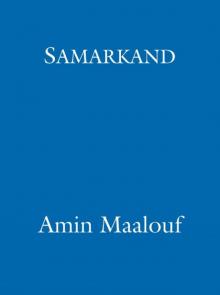 Samarkand
Samarkand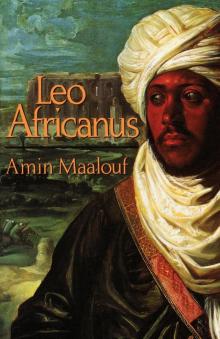 Leo Africanus
Leo Africanus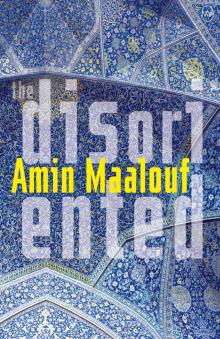 The Disoriented
The Disoriented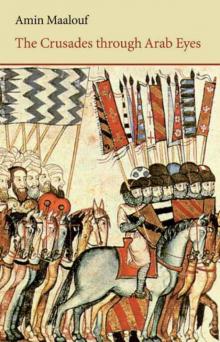 The Crusades Through Arab Eyes
The Crusades Through Arab Eyes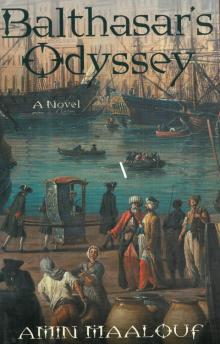 Balthasar's Odyssey
Balthasar's Odyssey